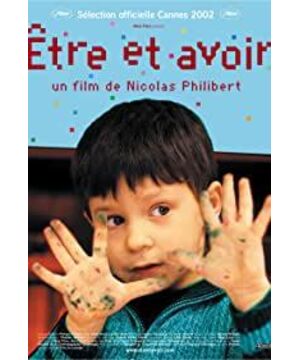- The film "Yes and You" analyzes
that "Yes" and "Have" are actually very basic verbs, which are the simplest in grammar, so they also symbolize the enlightenment of learning. The documentary records a story between teachers and students: in a remote village in France, there is an elementary school with only one class, one teacher and several children of different ages. George, the only teacher in the village, has sent away batch after batch of students over the past 20 years. In this land that seems to be isolated from the world, he walks with the children through spring, summer, autumn and winter, accompanying them to study and play... He is a teacher and a friend of the children.
The rhythm of the film is very slow and beautiful. On a snowy morning in winter, the sky is light blue, the melodious flute is slowly blowing, the branches and leaves of the treetops are gently swaying, and a white old Bread walked through the forest path and stopped at a farmhouse. The mother sent the children to the car. There were more and more children in the car. They greeted them in the car. The children saw Mr. George standing at the door to greet them from a distance... In this way, they began to talk about their study and living conditions in a semester.
The film does not use a lot of special effects, the lens is simple and real, and it is this simple and elegant lens language that makes the film unique like deep eyes. The beauty of this countryside needs no fancy decoration, nor does George's friendliness and kindness need a false foil.
Undoubtedly, George is a good enlightenment teacher, with endless enthusiasm and patience for children. Despite the children's different ages and learning tasks, he managed to keep everything in order. Beginners always forget the number after 6. After George sighed softly, he looked into the child's eyes tenderly, but there was no complaint or boredom in his helplessness. Of course, he has occasional harsh moments. When Zhu Zhu wants to go out with the children before he finishes painting, he doesn't approve. No scolding, just said: "You have to keep your promise." So, Zhu Zhu nodded. When Zhu Zhu was pushed by a child, George just let the child learn to empathize: "If he pushed you, what would you do?" I think, these words are not only for the education of children's learning, but also for them moral education. His humane approach to education will last a lifetime for them.
In such a special school, George, as the only teacher, might have preferred to consider him a friend. He will teach the children to make simple meals, take the children to snowboard together, take the train to an outing, greet them at the door in the morning, hold an umbrella for them on rainy days, help them celebrate their birthdays, comfort them, encourage them, tell them Be united, don't bully or be bullied by others.•••Finally, kiss the children goodbye and watch their backs gradually leave. His eyes are so focused, what a blessing and reluctance to part!
Director Philibel once wrote in his film notes: I was fascinated by the character of the only teacher in the school, and beneath his dignified appearance there was a deep concern, meticulousness and caution. For me, The impulse to make a film is often an impromptu accident, sometimes a voice, sometimes a face." Perhaps the most successful point of this film is the authenticity and simplicity of this accident.
View more about To Be and to Have reviews







